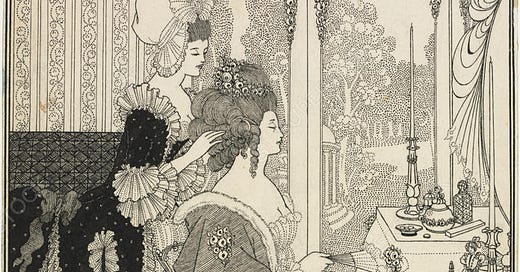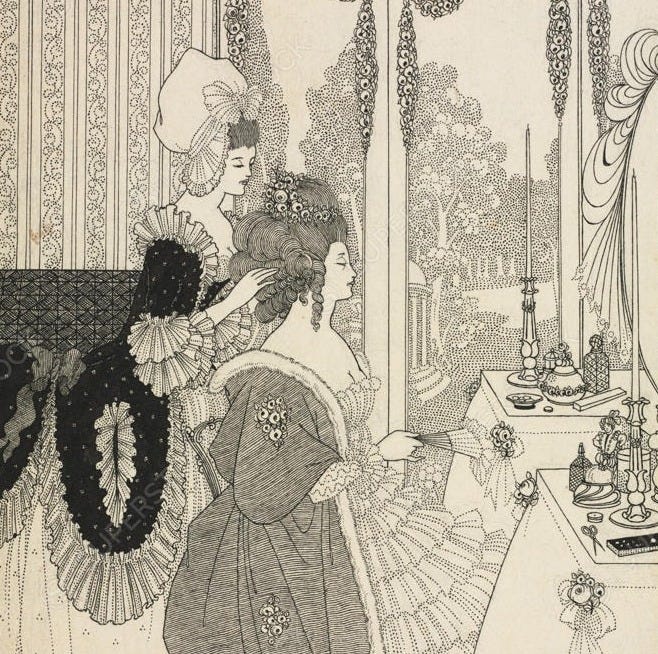What is the fanciest thing in our daily experience? Nowadays I don’t know, but in the time of our author today, Alexander Pope, it must have been the dress of men and women in the higher classes, and especially the women. Or maybe I shouldn’t even limit it to the rich, because you could go anywhere in Europe on a holiday and see all the people, from peasants to courtiers, decked out in bright and delightful garb. In those days, says C. S. Lewis, “drab was not a favorite color”! So did our Word of the Week, fancy, come into play. There’s something high-hearted and cheerful about the ceremonious, especially when you’re away from a lot of money, so that there’s little danger of what’s overdone and garish. I think of a picture I’ve seen of Calvin Coolidge — somehow I’ve got to think that Coolidge and the comedian Bob Newhart are kin — in South Dakota, honored by the Sioux and wearing a great big ceremonial headdress of eagle feathers. Coolidge looks whimsically satisfied with his hosts and their gift.
When we went to church on Easter Sunday, people were decked out in their best, just as the church was festooned with lilies everywhere. After all, an “Easter bonnet” was one you bought so that you could wear it for the first time then. It wasn’t a matter of pride, either, or it needn’t have been, because everybody was part of the celebration. And as a boy I took part in it also, wearing a jacket and dress shirt and tie, and shining my shoes with liquid polish. To this day, if I happen upon the smell of shoe polish, I will seem to be a nine-year-old boy again, scuffing my black shoes by the sink in the kitchen, while the rest of the family is doing this or that, getting ready for the pinnacle of the week.
Is pride a step or two away, though? Maybe, maybe. On a day in 1711, a young fellow who was a bit of a peacock and mischief maker, Lord Robert Petre, sneaked up behind his very pretty teenage cousin, Arabella Fermor, and snipped off a lock of her hair. It was a prank, but people took their coiffures a tad too seriously then, I think; in any case, it caused a falling-out between the two families, and poor Arabella wouldn’t even speak to Robert after that. The rift was a bit more serious than it might otherwise have been, because both families were Catholics, who at that time in England could not hold civil office, or even cast a vote, and couldn’t afford to be at odds with each other. So friends of both families asked the well-known poet Alexander Pope, also a member of a Catholic family — with a name like that, what else could he be, right? — to do what he could to help patch things up. What resulted was the merriest and most brilliant mock-epic poem in English, The Rape of the Lock. Be advised here: “Rape” means “theft,” but still, it wasn’t exactly a nice thing to do.
It may be hard for us to hear the word “satire” without thinking straightaway of mockery and flippancy and scorn, but that’s not what the form of poetry necessarily implied. Certainly the satire pokes fun at something, but it can do so with a gentle touch, even including real appreciation for what’s good and right and lovely about the object of the satire. That’s what Pope does in The Rape of the Lock. His heroine, Belinda, takes the place of the young Arabella Fermor, and she’s prettified and protected — well, they try to protect her, anyway — by an army of light-winged little spirits called “sylphs,” whose leader, Ariel, tries to warn her in a dream one early morning to beware of every girl’s enemy, Man; but that’s when her dog Shock (I’ve heard it was the French name Jacques, given to big fluffy dogs, and hence we say that somebody has a shock of hair; but it might also come from an Icelandic word for a shaggy dog) licks her face and wakes her up and she forgets everything.
Our passage comes right after that. The “toilet” table is whimsically described as an altar, Belinda as a nymph, and her chambermaid Betty as the priestess serving at the rites of Pride. On that table are all the accoutrements of female cosmetics. Notice especially what word is slipped in, and in plural form too, right in the middle of a lot of alliterating and near-alliterating objects of a sprightly girl’s makeup and party-going: “Puffs, patches, powders, Bibles, billet-doux” — invitations to a dance, that is. Why, all the world contributes to the makeup table, tortoise-shell combs from who knows where, and white ivory combs from Asian elephants. Pope intends that we should enjoy seeing these “rites” exaggerated in good humor, as if they were a kind of morning prayer every girl should practice. But he’s also gently reminding Arabella, and every Arabella and scapegrace Robert, that there are a lot more important things in life than dressing up, or snipping somebody’s hair.
And now, unveiled, the Toilet stands displayed, Each silver Vase in mystic order laid. First, robed in white, the Nymph intent adores, With head uncovered, the Cosmetic powers. A heavenly image in the glass appears, To that she bends, to that her eyes she rears; Th' inferior Priestess, at her altar's side, Trembling begins the sacred rites of Pride. Unnumbered treasures ope at once, and here The various offerings of the world appear; From each she nicely culls with curious toil, And decks the Goddess with the glittering spoil. This casket India's glowing gems unlocks, And all Arabia breathes from yonder box. The Tortoise here and Elephant unite, Transformed to combs, the speckled, and the white. Here files of pins extend their shining rows, Puffs, Powders, Patches, Bibles, Billet-doux. Now awful Beauty puts on all its arms; The fair each moment rises in her charms, Repairs her smiles, awakens every grace, And calls forth all the wonders of her face; Sees by degrees a purer blush arise, And keener lightnings quicken in her eyes. The busy Sylphs surround their darling care, These set the head, and those divide the hair, Some fold the sleeve, whilst others plait the gown: And Betty's praised for labors not her own.
Listen to this episode with a 7-day free trial
Subscribe to Word & Song by Anthony Esolen to listen to this post and get 7 days of free access to the full post archives.












